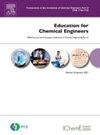培养技术熟练程度和专业技能:单位操作教育的多方面PO-PBL策略
IF 2.3
2区 教育学
Q1 EDUCATION, SCIENTIFIC DISCIPLINES
引用次数: 0
摘要
本文对化学工程教育中以项目为导向的基于问题的学习(PO-PBL)方法的实施和结果进行了全面分析,重点是单元操作项目(POU)课程。本研究考察了PO-PBL在培养学生技术熟练程度和基本专业技能方面的效果。该研究采用混合方法,分析了连续四个学期的数据,包括学生调查、绩效指标和定性反馈。将集成产品和过程设计(DIPP)方法、游戏化元素和生成式人工智能(GenAI)工具整合为改进学习成果的补充策略。结果表明,整个学期的技术技能都得到了持续或改善,学生的参与度、积极性和专业能力也有了显著提高,尤其是在沟通和团队合作方面。在人工智能评估量表(AIAS)的指导下,GenAI工具的实施表明,学生的研究能力和写作技巧有了很大的提高。虽然在实施过程中存在挑战,但POU课程成为化学工程教育的一个有前途的模式,有效地弥合了理论知识与实际应用之间的差距。本研究为创新的教学方法提供了有价值的信息,使学生为化学工程行业不断变化的需求做好准备。本文章由计算机程序翻译,如有差异,请以英文原文为准。
Fostering technical proficiency and professional skills: A multifaceted PO-PBL strategy for unit operations education
This contribution presents a comprehensive analysis of the implementation and outcomes of a Project-Oriented Problem-Based Learning (PO-PBL) approach in chemical engineering education, focusing on the Project of Unit Operations (POU) course. The study examines the efficacy of PO-PBL in developing both technical proficiency and essential professional skills among students. Using a mixed methods approach, the research analyzes data from four consecutive semesters, encompassing student surveys, performance metrics, and qualitative feedback. The integration of the Integrated Product and Process Design (DIPP) methodology, gamification elements, and Generative Artificial Intelligence (GenAI) tools are explored as complementary strategies to improve learning outcomes. The results indicate sustained or improved technical skills throughout the semesters, coupled with significant improvements in student engagement, motivation, and professional competencies, particularly in communication and teamwork. The implementation of GenAI tools, guided by the Artificial Intelligence Assessment Scale (AIAS), shows promising improvements in students’ research capabilities and writing skills. Although challenges in implementation are acknowledged, the POU course emerges as a promising model for chemical engineering education, effectively bridging the gap between theoretical knowledge and practical application. This study provides valuable information on innovative pedagogical approaches that prepare students for the evolving demands of the chemical engineering industry.
求助全文
通过发布文献求助,成功后即可免费获取论文全文。
去求助
来源期刊

Education for Chemical Engineers
Multiple-
CiteScore
8.80
自引率
17.90%
发文量
30
审稿时长
31 days
期刊介绍:
Education for Chemical Engineers was launched in 2006 with a remit to publisheducation research papers, resource reviews and teaching and learning notes. ECE is targeted at chemical engineering academics and educators, discussing the ongoingchanges and development in chemical engineering education. This international title publishes papers from around the world, creating a global network of chemical engineering academics. Papers demonstrating how educational research results can be applied to chemical engineering education are particularly welcome, as are the accounts of research work that brings new perspectives to established principles, highlighting unsolved problems or indicating direction for future research relevant to chemical engineering education. Core topic areas: -Assessment- Accreditation- Curriculum development and transformation- Design- Diversity- Distance education-- E-learning Entrepreneurship programs- Industry-academic linkages- Benchmarking- Lifelong learning- Multidisciplinary programs- Outreach from kindergarten to high school programs- Student recruitment and retention and transition programs- New technology- Problem-based learning- Social responsibility and professionalism- Teamwork- Web-based learning
 求助内容:
求助内容: 应助结果提醒方式:
应助结果提醒方式:


